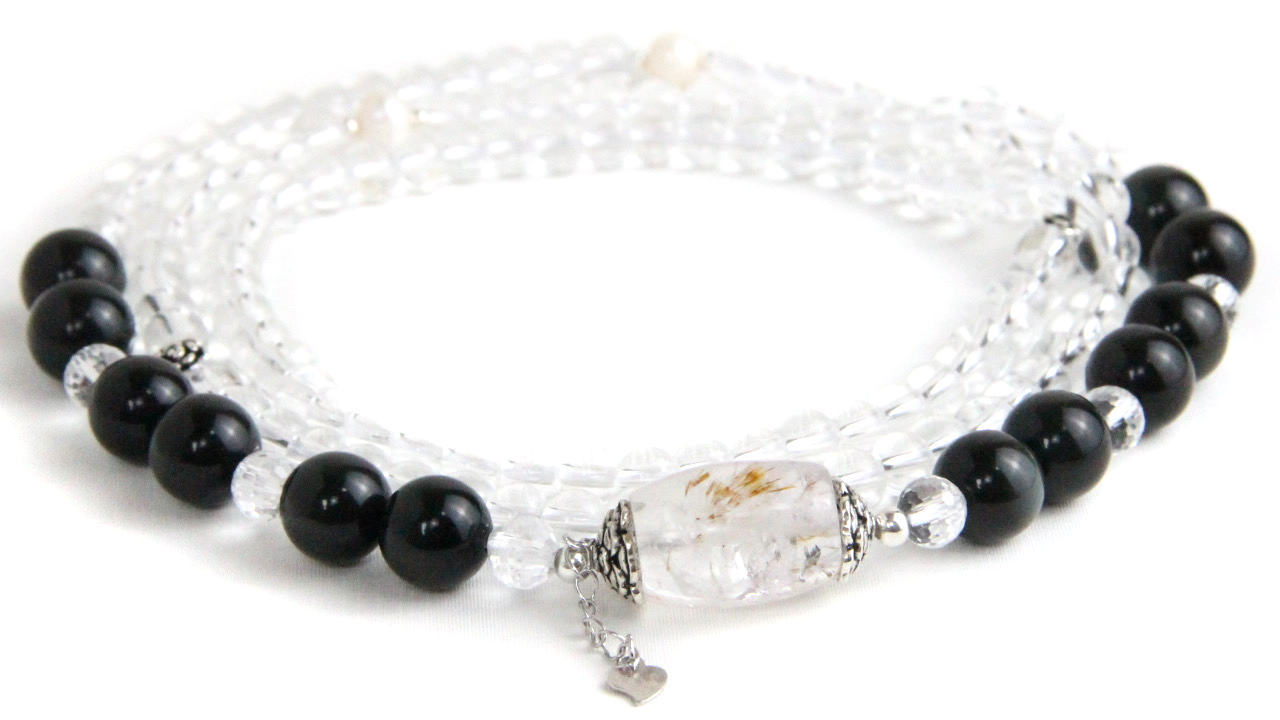Quartz crystals readily discovered by sifting flowing waters for rock crystals and visibly distinguished from surrounding sedimentary rocks in veins and outcrops have been natural sources of precious stone jewelry for ancient cultures dating from pre history.
Notably more weathering resistant than surrounding parent rock, the passing of time served to expose this beautiful crystal to early cultures when clearly juxtaposing itself in natural seams exposed against surrounding layered rock, and gave immediate spiritual and material benefits to those societies who discovered it.
Slighter hardier than steel on the Mohr scale quartz was highly valued in ancient culture as hand knapped axes with it’s prized use in this lithic stone technology being one of the longest continuous uses of technology to date.
A crystal that projects clean purity when compared to the rock in which it is often discovered many historical spiritual benefits are to be found recorded hand in hand.
The bible records the gemstone family member amethyst as conferring spiritual protection adorned to the breast plates of high priests, while Christian knights carried crystals of quartz for healing powers, and great thinkers such as Leonardo Da Vinci referred to it as bestowing keenness of thought.
Used extensively by the Celtic people of ancient Western Europe from the Alps to Ireland and Scotland – where large natural deposits are found – quartz was fashioned into myriad crystal figurines which are still to be found in these peoples ancient crypts, and was used in contemporary bead necklaces and bracelets which were traded widely.
Decorating headdresses and crowns larger quartz crystals were used by Egyptian royalty to emphasise social status, while shaman tribal soothsayers gained insights into the spiritual planes from early natural crystals, which were later machined into crystal balls that proved popular for divining in the early twentieth century.
Our own quartz jewelry design uses many quartz crystal family members for their contributions to rich and interesting design, which with varied colouring, myriad lustres of sparkling light and deep inclusions of precious minerals make a fantastic art palette for a modern fashion designer.
Quartz as a mineral is found widely in nature and is an important element of constitution for many rocks such as granite, while after being weathered down though the passing of ages it is found widely distributed as sand particles on beaches around the world.
Quartz is often quarried from deep rock veins, where layers between sedimentary rocks have allowed spaces for the crystals to slowly grow into, and provide for rich sources of surrounding mineral to crystallise and grow from.
Sometimes smaller localised pockets of quartz crystals grow from minerals of other rocks deep below the ground which can be discovered filling large natural crystal clusters.
Natural crystal geodes are formed when hot lava traps gas bubbles which then form into cavities that allow minerals of surrounding material to gradually grow into.
Growing in subterranean high temperature silica rich environments the quartz minerals crystallizes into a variety of well known rock crystals such as citrine and amethyst.
Quartz crystals have two primary types of which the larger macro crystal type is found in many of our quartz jewelry collections and whose crystal structure can be discerned by eye.
This type includes the classic rock crystal white quartz, which as a close to transparent crystal reflects ample light and contrasts well against black and darker opaque hue design.
Ancient Egyptian necklaces and bracelets featured natural quartz crystals as centrepieces of designs that included supporting beads of golden ceramics and precious stones such as emerald.

Possessing greater design depth are the rutilated quartz varieties, these quartz crystals have grown together with rutile inclusions of other minerals and metals that grow naturally within the crystal.
In rutilated quartzes colourful metals such as copper or silver and minerals such as green chlorite are subsumed by a growing quartz crystal or slowly amalgamate together adding beautiful colouring and depth to designs which make use of them.
In our own designs rutile quartzes balance stronger colours in amethyst and other gemstones with the lighter crystals of quartz when used as supporting beads.
Rutile quartzes are an important part of our designer jewelry for their versatility which when balanced with stronger colours acts as a medium to project concepts that make use of many different gemstone types.
Well known quartz jewelry family member amethyst obtains her famous purple colour from the inclusion of scattered iron elements which in deep purple Siberian amethyst is famously prized.
Amethyst colours vary greatly across the world with deep purple to barely visible purple, scattered light and dark colouring and stable colours all being found.
Siberian amethyst as well as other varieties of this quartz family member can be read about in our blog article here.
Amethyst is widely found in Brazil and in many places grows in conjunction with the lighter coloured citrine, even so far as forming a twinned crystal that has traits of both parent crystals that is known as ametrine.
Yellow quartz is called citrine and shines with a range of bright yellow tones from golden citrine’s golden hues to Madeira citrine brown shades and yellow citrine’s lemon yellow colouring.
Quartz family members such as these examples cover many hundreds of other naturally formed crystals where the crystal form is readily apparent to the eye.
Where quartz crystals are not readily apparent to the eye they are termed cryptocrystalline quartz – so called as the crystals are cryptic, these quartz crystals include agate and chalcedony varieties which are used in many of our necklace designs.
Made up of millions of tiny crystals these gemstones posses some of the translucency and reflectivity of macro quartz crystals but with unique properties that come from their makeup, such as deeper colouring and fantastic scattering of reflected light.
Chalcedony is one of this type of quartz with it’s translucent milky colour coming from reflections of light from the tiny micro crystal quartzes.
Though not as transparent to light as macro crystal quartz, it’s hardness and resilience to cutting in common with other microcrystalline quartzes make for easier shaping of pendants and other pieces which are subsequently beautifully shaped.
Our own quartz jewelry includes peace, ring and heart pendants made of milky white chalcedony which impart purity to design and act to balance stronger opaque supporting bead colours while possessing some of the same reflective lightness that is found in other crystal quartzes.
The special type of chalcedony shown in the pendant necklace photo above is a petrified chalcedony.
Forming over many hundreds of millions of years tiny quartz crystals grow into and very slowly replace organic matter leaving visible vestiges of their original fragile forms.
The quartz jewelry piece above shows the forms of tiny marine plants which have left delicate light impressions in the chalcedony matrix, a memory from a warm aquatic world that covered the Earth in a time far removed from our present age.
Belonging to a special type of chalcedony these pieces have stronger natural connections being intimately connected to the living world.
In our quartz jewelry designs petrified chalcedony is often used in forest concepts which project feelings of woodland glades, or in aquatic ocean concepts with projections of aquatic nature and blue ocean tones.
An opaque variety of a micro crystalline quartz is the solid coloured jasper, a form of chalcedony that though lacking translucency shows more strong distinctive colours, though this gemstone is not found in our collections at time of writing.
Agate is a banded chalcedony that is much more translucent to light and can show striking colour bands and landscape impressions where chalcedony is typically comprised of more opaque white colouring.
One colourful and translucent agate variety is banded agate whose bands of colour, though sometimes less colourful than other gemstones, display as painted landscapes and in “moss” agate abound with natural fern like structures.
Our family of quartz jewelry uses the natural lightness and quartz crystal transmission of light as an aid to designs that add levity to natural gemstone and balance stronger natural colours into more balanced designs.
In the above picture an excellent example of cherry blossom agate shows some translucency while with beautiful natural patterning radiates purity while lifting the blue colouring of the supporting beads and adding a deftness of light to the necklace.
Quartz and it’s myriad family members have been friends of jewelry lovers and designers across millennia and enriches our own in house jewelry design in a unique way to our collected necklaces and bracelets.
YAN fashion quartz jewelry styles use quartz as both central and supporting aspects of design depending on the amount of colour and the intended use of the jewelry.
Our designer quartz jewelry is designed with a principal idea and the use of quartz crystals in the design act as an aid to projection of this central concept focus.
With so many types of quartz to choose from with differing colour and lustre of light quartz can be selected as both a central bead that acts as the focus, or as a lighter supporting bead to balance or help project an idea.
In quartz jewelry designs that use many different types of gemstone quartzes can balance harmoniously with crystals such as lighter green prehnite crystals or translucent white moonstone which allows selections of different semi precious stones to act together to carry forward a design concept.
Lighter quartz crystals such as white quartz are also used frequently in our black obsidian bead necklaces and bracelets where their natural light radiance serves to lift darker obsidian blacks.
Even in our gothic range of jewelry that is rich in beautiful black tone, the presence of crystal beads of quartz add a lightness to design and brings an unmistakable natural levity such as in the photo of a bracelet above.
In some of our designs both crypto and crystal quartzes are used together resulting in light radiant designs such as our pixie princess necklaces which are deft and nimble in tone.
I n the necklace above a pendant of agate with a high degree of translucency allows matching to lighter macro crystal phantom quartz beads whose faint vestiges of precursor crystals balance well with the detail in the pendant.
Natural necklaces such as rose woods and wing woods – though not gemstone in nature, can also balance with crypto crystalline agates and chalcedonies.
The following photo shows floral impressions from the cherry blossom agate match well to rose wood beads whose own surface projects natural energy further encouraged with bouquets of silver roses and floral agate supporting beads.
Quartz is to the crystal world as a flower is to the world of plants, at once ubiquitous and widespread in nature though both precious and beautiful no matter where it is found.
Incorporated into quartz jewelry design this crystal of every colour and variety lends itself to harmonising with almost every conceivable type of gemstone acting as a go between of light and dark tone and giver of levity to darker lustres.
As a central bead quartz – as it has done for hundreds of thousands of years, stands out with purity of natural energy projecting light from itself, while selflessly balancing with a range of different jewelry design.
The fantastic family of quartz crystals are an artists treasure trove of colour and light that imbue each piece of jewelry with beauty and selfless energy.
More designer quartz jewelry talked about in our article can be seen in our category of quartz necklaces and bracelets we hope you love our gemstone articles and check our fashion blog for more articles.

